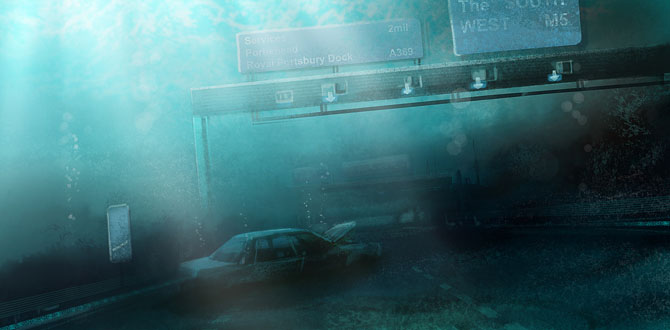In case you didn’t know, the flood smells. I don’t know whether the others had this impression, but I think, and I have a very sensitive nose, that I will remember the Obrenovac flood by the smells. If you’re lucky, the flood will smell like the river, if not, it will stink of the sewer. You will also, eventually, inevitably smell a corpse. I hope that was an animal corpse. The smell of human bodies dominates the squares where those who managed to avoid immediate danger gather, but even for sensitive noses, this smell is soothing, because it represents the deceptive safety of the crowd. The crowd will show its ugly face later. The smells of the flood are strongest during the night, that’s when the senses are most active, because you can’t see anything in the dark and the people tend to become quiet. They are probably trying to hear the water rising, but it is mainly silent, except for an occasional crack or thump. The lights and sounds coming from the submerged cars are the most unnerving. Short circuits flicker the lights, turning on signals and alarms, and, before you remember what’s happening, you think that there are people who need help in those cars. But, it’s not the people, but the afterlife of drowned cars. To me, it was the eeriest thing: the flashing of lifeless lights in pitch darkness.
A few days ago I started believing that panic and psychology of the pack are contagious. If they transfer from one person to another by air, it they reproduce quickly like bacteria and if their intensity grows exponentially, then they are basically the same as the plague. Anyone who read “The Rabies” by Borislav Pekic will recognize the symptoms of these contagions.
You feel certain solidarity at the moment you get out of grave danger. At that moment, no one says “what’s in it for me?” The good thing about these disasters is that they remind you that there are no individuals, only society and that society is sometimes the only defense for individuals. If I am not mistaken, two and a half decades ago we were hit by the society of every man for himself. Those who understood this became tycoons, those who didn’t became suckers and everything was idyllic until this disaster happened.
Another impression that stays with you after the flood passes is the awareness of the power of water. At some places, the flood is as slow as a snail, but still unstoppable, because it comes from the ground and defense is impossible. It seems that only in those moments we realize how powerless society is to defend itself from the troubles it causes. Without a doubt, these floods are, more or less, a direct consequence of global warming, so we should get used to them, because I guess they will keep happening. I don’t understand how it happened that we can look at such consequences and say: there is no alternative.
I also learned how refugees feel. It is a strange feeling, since everything is upside-down compared to the feeling you have at home surrounded by your stuff. Instead of going into the house for rest, you feel like an intruder and go out to rest in the streets. You pack as many things as you can in your backpack, trying not to crowd your hosts and to stay outside as long as you can, because, when you are in the streets, no one can tell that you are a guest. Only a sweatshirt around your waist gives you away.
***
And now, a bit of politics as an act. My impression is that the situation in Obrenovac and its camps started improving only after the military began taking over. Before that, everybody ordered everybody around, fought over the jurisdiction and hardly anybody knew any procedure or protocol. Besides, when was the last time you saw that familiar poster, once a mandatory décor in any institution, telling you how you should react in emergency situations and the sound of this of that emergency signal. It looks like mismanagement, which undoubtedly contributed to the disaster, was caused by the twenty five years long tradition of nepotism. But, my personal impression is that it was also caused by gerontophobia of the young political elite which has been storming the positions of power since 1990.
For twenty five years, it was more important how well you fit the dominant model of assault-manager (politically, esthetically, ideologically and party-wise). Of course, it was necessary to systematically discard old experts over the years (who suffer from unnecessary relics from the past: maps showing the altitudes and floodplains), but first they had to be pronounced conservative, incompetent, stubborn and, of course, those who interfere with the progress. Also, it is certain that the policy of cutting public services, which transferred responsibilities to those who are completely incompetent in order to give them lucrative jurisdictions, is to blame.
What seems to be forgotten (repressed, sacrificed, whatever) is that, at some point, someone would have to deliver and that that deliverance is a craft that has to be learned. It seems that our officials haven’t heard of the middle-age saying: if you are the smartest one in the room, then you are in the wrong room. Superfluous managers and unclear hierarchy caused complete chaos: they managed each other, everyone got their wish to be in charge (everyone was in charge and no one was responsible), everyone coordinated everyone and chased their own tails, and things were sloppy. In order to be the smartest one in the room, they had to isolate themselves; that’s the reason for Yugoslavia’s demise. The new states, however, failed to maintain the levees, those relicts of socialism, for three decades.
The author is a resident of Obrenovac.
Translated by Marijana Simic
Peščanik.net, 21.05.2014.



